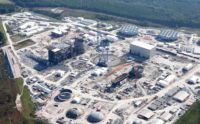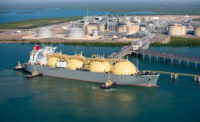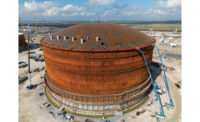Following a dispute over pay between consortium partners Kawasaki Heavy Industries (KHI) of Japan and Laing O'Rourke Australia Construction, the Australian contractor in March sent home 800 workers on the $35-billion Ichthys LNG project in Darwin. The subcontractor to JKC Australia was building four large cryogenic tanks and other infrastructure for the project. Neither party has disclosed details of the dispute, but Laing O'Rourke said in a local media report that it had not been paid "for several months."
In a company statement earlier in March, JKC Australia LNG Project Director John Bramley said the company was "aware the parties in the Kawasaki Heavy Industries and Laing O'Rourke consortium—the engineering, procurement and construction subcontractor for the cryogenic tanks at the Ichthys Project Onshore LNG facilities—are in dispute with each other."
Under a project contract signed in May 2012, LNG tank specialist KHI and general contractor Laing O'Rourke teamed to construct four cryogenic tanks for JKC Australia LNG Pty Ltd. On-site work began in mid-2013 and had reached in its final stages when work stopped, with tanks more than 90% complete.
Laing O'Rourke said, "KHI, which leads this phase, has not paid Laing O'Rourke for its work on this complex and [the] resource-intensive remote engineering project for several months. Laing O'Rourke has made significant efforts to resolve the matter, but direct approaches to KHI in Japan over recent weeks have failed to produce a satisfactory outcome."
After the most recent meeting in Tokyo in mid-March, Laing O'Rourke served notice that it would take action to protect itself from the consequences of KHI's conduct, unless urgent measures to rectify the situation occurred. So far, KHI hasn't budged.
Laing O'Rourke said that, currently, its priority was to attempt to redeploy staff to the company's significant national pipeline of projects while assisting subcontractors impacted by this demobilization. "Laing O'Rourke, which has operated in Darwin and the NT [Northwest Territory] for almost 50 years, has ensured all staff, suppliers and contractors have received their entitlements during the period of dispute. The company's other project on the Ichthys site, which is direct for JKC, is unaffected."
In the March 15 demobilization, Laing O'Rourke released approximately 300 locals to go home. Approximately 500 fly-in, fly-out workers returned to the 3,500-bed Howard Springs Accommodation Village in Darwin and flew home on the next available flight. “Following previous success in redeployment, JKC has encouraged other subcontractors on the project to consider these workers for any vacant positions they may have,” Laing O'Rourke said in a statement.
For its own part, JKC said it was not in dispute with the KHI and Laing O'Rourke Consortium and noted that the subcontract for this scope of work remains in place. The company added that it is working with the subcontractor to put plans in place to complete the works.
The engineering, procurement and construction of the cryogenic tanks is approximately 91% complete, and JKC remains committed to delivering this scope of work and the overall Ichthys Project Onshore LNG Facilities.
In May 2012, Laing O'Rourke teamed with leading global LNG tank specialist Kawasaki Heavy Industries under an engineer-procure-construct contract to deliver a network of four massive cryogenic tanks for the Ichthys LNG project in Darwin in Australia's Northern Territory.
JKC Australia LNG Pty was awarded the contract for one of the largest packages within the Ichthys program, an initiative of the INPEX Corp. and Total Gas. The cryogenic-tank package consists of two 165,000-cu-meter LNG tanks, one 85,000-cu-m propane tank and a 60,000-cu-m butane tank.
The Ichthys project will have an initial capacity to produce 8.4-million tonnes of LNG per year and 1.6 million tons per year of LPG, as well as approximately 100,000 barrels of condensate per day at peak. The contract is one of the largest and most critical packages within the Ichthys program.
The issue has highlighted Australia's faltering ambitions to become the world's biggest producer and exporter of LNG. There have been rumblings about difficulties on another project, Shell's Prelude, a giant floating production vessel, but the client says it is on schedule, with significant cash flows expected in 2018.
"As Prelude construction nears completion, the focus remains on building a facility that is safe, profitable and reliable," a spokesman said this month. Last year marked “a transition from construction to commissioning in Geoje, South Korea, where the facility is being built,” he added. "The team achieved the successful commissioning of key pieces of equipment, such as air compressors, water-cooling pumps and steam boilers."
The source said that 150 Australian production technicians, who eventually will man the facility when it is operating, are currently working in the shipyard. The Australian team is supporting the commissioning of the facility but also preparing the systems and processes for the operations and maintenance phase.
The Prelude production wells and subsea infrastructure are now complete after a number of offshore campaigns at the site. The project's on-site command center, dubbed the Prelude FLNG Collaborative Working Environment, will provide around-the-clock communications and support during operations. It is now up and running in Shell's Perth headquarters and ready to receive the platform when it moves from Geoje to offshore Western Australia waters.





Post a comment to this article
Report Abusive Comment